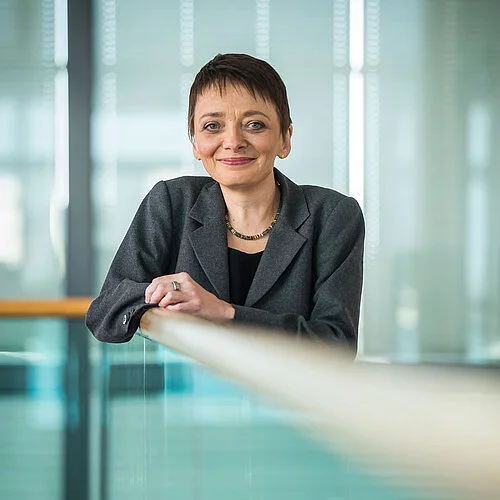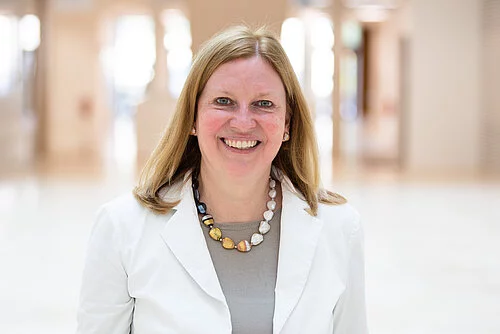Two PMI female scientists rank among the world's top female researchers
Professor Jeanette Erdmann and Professor Christine Klein are among the top 1000 in the "Best Female Scientists" ranking of the science portal Research.com.
Academic research is still dominated by men. As a result, the many successful female researchers are easily overlooked. In order to honor them appropriately and make them visible, the science portal Research.com has this year for the first time identified the world's best female scientists of 2022. A total of 1,000 female researchers from around the world are represented in the first edition of the "Best Female Scientists" ranking. It is intended to serve as an inspiration for the next generation and will be released annually in the future.
The USA dominates the ranking with 623 female scientists. Great Britain comes in second with 96 female scientists, followed by Germany with 42 female researchers, including two researchers from the Cluster of Excellence "Precision Medicine in Chronic Inflammation" (PMI): Prof. Dr. Jeanette Erdmann, Director of the Institute of Cardiogenetics of UKSH, Lübeck Campus, and Prof. Dr. Christine Klein, Director of the Institute of Neurogenetics of UKSH, Lübeck Campus.
Prof. Klein are not only included in the 2022 "Best Female Scientists" ranking, but are also on the 2022 "Highly Cited Researchers" list. This ranking lists those researchers whose work has been cited most frequently by their peers worldwide in their own work.
About the scientists:
Prof. Dr. Jeanette Erdmann is a steering committee member of the Cluster of Excellence "Precision Medicine in Chronic Inflammation" (PMI). Since 2013, she has headed the then newly founded Institute of Cardiogenetics, of UKSH and the University of Lübeck (UzL). She has been at UzL since 2003 and was appointed W3 professor for life in Lübeck in 2012 and subsequently DZHK professor by the German Center for Cardiovascular Research. The aim of the Institute of Cardiogenetics is to better understand the genetic factors leading to cardiovascular diseases, e.g. atherosclerosis and myocardial infarction, in order to develop new therapies. Since beginning her doctoral work, Jeanette Erdmann has been studying the inheritance of common, so-called complex diseases, initially schizophrenia and depression, and for more than 15 years cardiovascular diseases. In the meantime, the biologist has expanded her field of research and is also currently developing a therapy with her team for a rare neuromuscular disease that she diagnosed in herself a few years ago. Prof. Erdmann was elected a member of the National Academy of Sciences Leopoldina in 2021 for her outstanding scientific achievements. "Of course I am delighted to receive such an award, but one must also always emphasize that research is teamwork and that without my great team this success would not be possible," says Prof. Erdmann.
Prof. Dr. Christine Klein is also a steering committee member of the Cluster of Excellence "Precision Medicine in Chronic Inflammation" (PMI). Since 2013, she has headed the Institute of Neurogenetics at UKSH and UzL and the Neurogenetics Section at the Department of Neurology at UKSH, Lübeck Campus. Prof. Klein and her research group conduct research on rare hereditary disorders such as familial Parkinson's syndromes or dystonia, a group of movement disorders that have their neurological origin in the motor centers in the brain. Prof. Klein's focus is particularly on the question of why many people who are carriers of a disease-causing genetic mutation do not become ill but remain healthy. Another goal of the research group is to find out to what extent the respective genetic makeup of the patients leads to therapies being successful in some of them; others, however, benefit more from other methods. Since 2021, Christine Klein has been a member of the National Academy of Sciences Leopoldina due to her outstanding scientific achievements. "My special thanks go not only to our team in Lübeck, but also to the many national and international cooperation partners and subjects who entrust us with data and samples and often travel long distances for studies, which makes our work on rare neurogenetic diseases possible in the first place," says Prof. Klein.
About the ranking:
The "Best Female Scientist" ranking takes into account data from almost 167,000 female scientists in 24 research disciplines. Among other things, the number of scientific publications per candidate and awards received played a role in the evaluation methodology. With its ranking, Research.com aims to inspire female scientists and women aspiring to an academic career through the example of successful women in science. This is intended to help create more opportunities and equal chances for women in science.
Prof. Dr. Jeanette Erdmann, Steering Committee Member of the Cluster of Excellence PMI and Director of the Institute of Cardiogenetics, University of Lübeck and UKSH, Lübeck Campus.
Further links:
Ranking of Research.com:
https://research.com/scientists-rankings/best-female-scientists
More information about the ranking:
https://research.com/careers/2022-best-female-scientists-ranking-highlights-the-work-of-1000-spectacular-women
About the Cluster of Excellence PMI
The Cluster of Excellence "Precision Medicine in Chronic Inflammation" (PMI) is being funded from 2019 to 2025 through the German Excellence Strategy (ExStra). It succeeds the "Inflammation at Interfaces” Cluster, which was already funded in two periods of the Excellence Initiative (2007-2018). Around 300 members from eight institutions at four locations are involved: Kiel (Kiel University, University Medical Center Schleswig-Holstein (UKSH), Muthesius University of Fine Arts and Design, Kiel Institute for the World Economy (IfW), Leibniz Institute for Science and Mathematics Education (IPN)), Lübeck (University of Lübeck, University Medical Center Schleswig-Holstein (UKSH)), Plön (Max Planck Institute for Evolutionary Biology) and Borstel (Research Center Borstel - Leibniz Lung Center).
The goal is to translate interdisciplinary research findings on chronic inflammatory diseases of barrier organs to healthcare more intensively, as well as to fulfil previously unsatisfied needs of the patients. Three points are important in the context of successful treatment, and are therefore at the heart of PMI research: the early detection of chronic inflammatory diseases, the prediction of disease progression and complications, and the prediction of individual responses to treatment.
Press office
fbuhse@uv.uni-kiel.de+49 (0)431/880 4682 https://precisionmedicine.de
Cluster of Excellence "Precision Medicine in Chronic Inflammation"
Scientific Office
Head: Dr. habil. Susanne Holstein Postal
Christian-Albrechts-Platz 4, 24118 Kiel, Germany
Contact: Sonja Petermann
+49 (0)431 880-4850, fax: +49 (0)431 880-4894
spetermann@uv.uni-kiel.de
Twitter: PMI @medinflame





